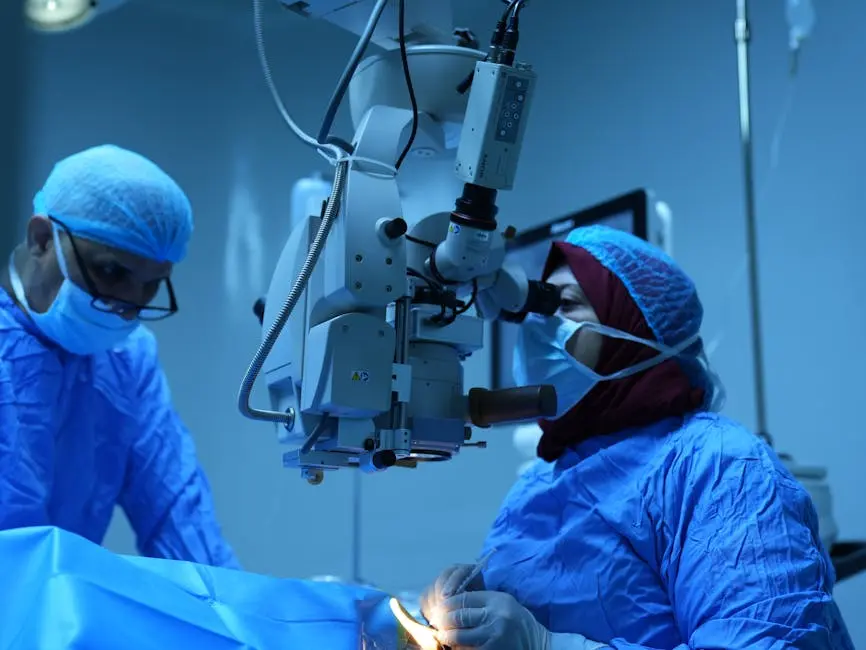
Eye surgery can be a life-changing decision, offering improved vision and quality of life. However, like any medical procedure, it comes with risks and benefits. In this FAQ, we’ll explore both sides to help you make an informed decision.
Understanding the Different Types of Eye Surgery
Various types of eye surgery are available, ranging from LASIK for vision correction to cataract surgery for clouded lenses. Knowing the specific procedure you’re considering is the first step in understanding its risks and benefits.
LASIK surgery is one of the most popular types of refractive surgery, aimed at correcting vision problems such as myopia, hyperopia, and astigmatism. It reshapes the cornea so that the light entering the eye can be properly focused onto the retina LASIK surgery.
Cataract surgery, on the other hand, involves the removal of the lens of your eye when it’s clouded, usually replaced by a clear artificial lens. This procedure is typically considered when a cataract prevents you from doing your usual activities.
Benefits of Eye Surgery
Eye surgery can significantly improve vision clarity, reduce dependency on glasses or contact lenses, and enhance overall quality of life. For some, it decreases eye strain and improves vision-related activities.
Many patients experience a newfound sense of freedom with reduced dependence on corrective lenses, allowing them to engage more easily in activities such as swimming, hiking, and sports. A successful eye surgery can indeed open up a world of new possibilities.
Long-term benefits can also include improved safety. For instance, driving becomes less risky with better vision, which enhances your overall independence and confidence.
Potential Risks of Eye Surgery
As with any surgery, there are inherent risks. These can include infection, dry eyes, changes in vision, and, in rare cases, loss of sight. Discuss all potential risks with your surgeon.
Some patients may experience complications such as seeing halos around lights, or increased sensitivity to glare, particularly in low light conditions. These effects, though often temporary, can impact daily activities initially.
One commonly noted risk is dry eyes. After surgery, some patients experience a temporary decrease in tear production; dry eyes can cause discomfort and blurriness, requiring detailed discussion with your healthcare provider.
Evaluating Candidacy for Eye Surgery
Not everyone is a good candidate for eye surgery. Factors like age, eye health, and medical history can affect your suitability. An in-depth consultation with an eye care professional is crucial.
Your lifestyle and expectations will also be considered when evaluating your candidacy. For instance, if you require near-perfect vision for certain activities, this should be discussed thoroughly with your doctor.
Certain conditions, such as autoimmune disorders or specific chronic diseases, can influence the risks, making a candid evaluation essential before proceeding.
Preparing for Eye Surgery
Proper preparation can minimize risks and enhance recovery. Follow pre-surgery instructions from your healthcare provider, such as avoiding contact lenses before the procedure.
You may be advised to clean your eyes carefully the day before surgery and to avoid applying any makeup or lotions around your eyes to prevent infection.
Having clear transportation arrangements for the day of surgery is essential, as you won’t be able to drive yourself home afterward.
Post-Surgery Care and Recovery
Post-operative care is essential for a successful recovery. This includes following your doctor’s instructions, attending follow-up appointments, and protecting your eyes as they heal.
Using prescribed eye drops as directed is vital. These medications help prevent infection and inflammation, ensuring a smoother recovery process.
Keep in mind that it’s important to avoid strenuous activities and any actions that might put pressure on your eyes while recovering. This could include heavy lifting, swimming, and avoiding direct sunlight without proper protection.
Making an Informed Decision
Deciding to undergo eye surgery involves weighing the potential benefits against the possible risks. It’s essential to discuss with your ophthalmologist and consider your personal circumstances to make the best choice for your eye health. For more personalized care and information, consider visiting our homepage to learn more about how we can assist you with your eye surgery needs.

